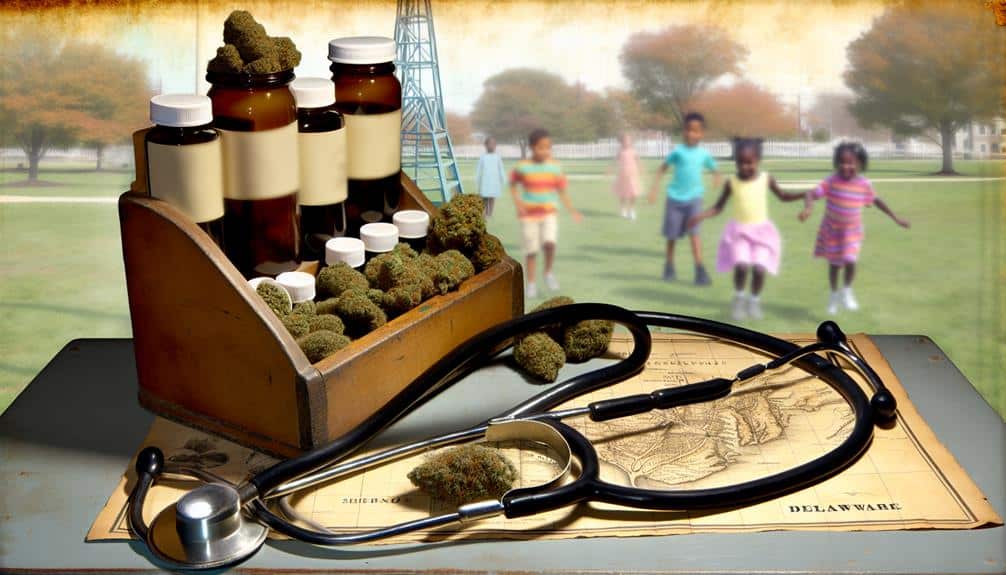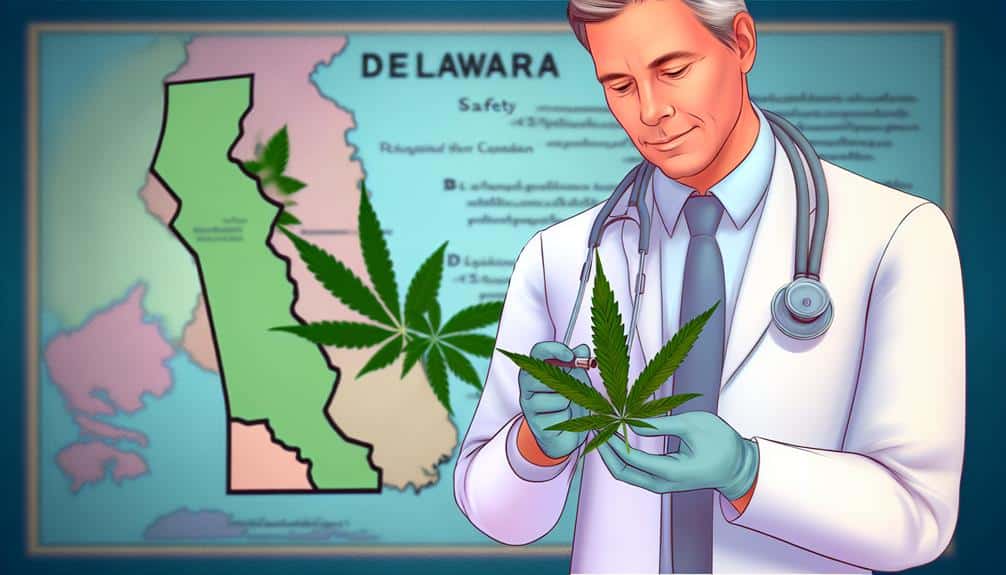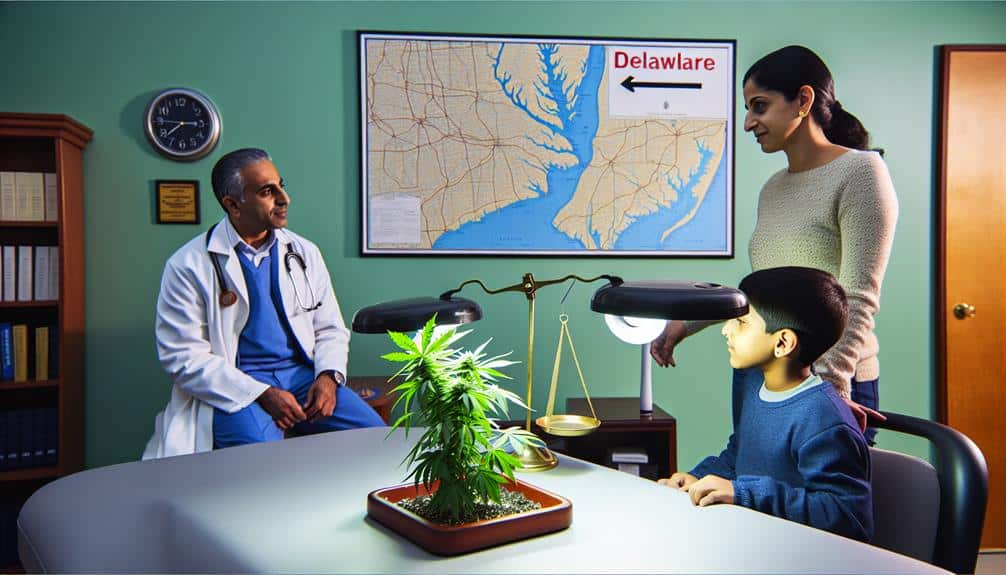In Delaware, the pediatric use of medical marijuana presents a delicate balance of ethical considerations, safety concerns, and regulatory challenges. As a healthcare provider, navigating the fine line between potential benefits and risks is crucial, particularly regarding dosage and long-term effects on a child’s developing brain. The question remains: How well are Delaware’s physicians trained in understanding these complexities? And how effectively are treatment plans monitored and adjusted to ensure the welfare of these young patients? This intricate dance involves many factors, each worth further exploration.
Table of Contents
Historical Context of Medical Marijuana

The historical context of medical marijuana reveals a long and complex journey that spans across centuries and continents. Cultural perceptions have varied widely from ancient societies using cannabis for its medicinal qualities to the later demonization of the plant in the 20th century.
In the ancient world, medical marijuana was respected. Middle Eastern and Asian cultures employed it for various ailments. However, views shifted drastically with the advent of the 20th century. The plant’s legal evolution has been marked by a series of prohibitions and regulations influenced by changing cultural contexts and political atmospheres.
In the U.S., marijuana was initially classified as a narcotic stigmatizing its use. Despite its historical medicinal use, cultural perception had shifted resulting in a widespread ban. Yet, late 20th-century developments saw reevaluation leading to gradual acceptance which resulted in legalization in states like Delaware.
Understanding this history is essential especially for those in service-oriented fields. It’s a reminder that cultural perceptions and legal evolution are fluid, often reflecting society’s evolving understanding and acceptance of medicinal practices.
Understanding Pediatric Medical Needs
Given the historical context and evolving cultural perceptions of medical marijuana, it’s now important to examine specific cases, particularly in pediatrics where medical needs can be unique and complex. It’s essential to understand that childhood disorders aren’t simply scaled-down versions of adult conditions. They possess unique characteristics and may require specialized pediatric pharmacology.
In the context of pediatric medical needs, it’s crucial to consider the specific biological and developmental factors that set children apart from adults. This is where pediatric pharmacology comes into play providing valuable insights into how children’s bodies metabolize drugs differently and how varying dosages can have profoundly different effects.
Pediatric medical needs extend beyond physical conditions. The prevalence of neurological and psychological childhood disorders also necessitates careful consideration. Conditions such as epilepsy, autism, and ADHD can significantly impact a child’s quality of life and development. Addressing these conditions often requires a fine balance between managing symptoms and minimizing potential side effects.
Medical Marijuana: Potential Benefits

Exploring the potential benefits of medical marijuana is important for understanding how this natural remedy can be a game-changer for pediatric patients suffering from various conditions. The arena of cannabinoid therapies is still in its infancy but early results show promise.
Medical marijuana’s pharmacology is complex but essentially, its active components interact with the body’s own endocannabinoid system to help regulate pain, mood, appetite, and other vital functions. For children with intractable epilepsy for example, cannabinoid therapies can reduce seizure frequency and severity. For those undergoing cancer treatments, it’s been shown to manage nausea and stimulate appetite improving their quality of life.
Its anti-inflammatory properties can also help kids with autoimmune disorders while its neuroprotective qualities could potentially benefit those with neurodegenerative diseases. Understanding marijuana pharmacology is key to maximizing its potential while minimizing side effects.
In Delaware, with its progressive stance on medical marijuana, the potential for pediatric application is exciting. But it’s not a one-size-fits-all solution. Each child’s unique medical circumstances should guide its use.
With careful implementation and ongoing research medical marijuana can offer a new avenue of hope for children grappling with serious health challenges. It presents a promising horizon in pediatric medicine.
Safety Concerns for Young Patients
While the potential benefits of medical marijuana for pediatric patients are promising it’s crucial to consider the safety concerns that come with its use in young patients. A primary issue is dosage determination. Unlike adults children’s bodies are still developing making it much harder to ascertain the appropriate amount. An overdose can lead to severe adverse reactions like impaired cognitive function anxiety and hallucinations.
Moreover the long-term effects of medical marijuana on developing brains aren’t fully understood yet. Some studies suggest it could potentially hinder cognitive development if used over an extended period but more research is needed.
Additionally as with any medication there’s a risk of adverse reactions ranging from minor side effects like drowsiness or dizziness to more severe ones such as respiratory problems or dependency. It’s important that doctors closely monitor patients for any signs of these reactions and adjust treatment plans as necessary.
Ethical Dilemmas in Pediatric Use

Beyond the physical safety concerns another complex issue to grapple with is the ethical dilemma that arises when considering medical marijuana use in pediatric patients. The legal implications are one of the key factors that complicate the ethical landscape. For example even though medical marijuana use is legal in Delaware it’s not federally recognized. This discrepancy could potentially expose healthcare providers or families to legal risks.
Additionally societal attitudes towards marijuana especially for pediatric use can create ethical issues. Some perceive its use as harmful potentially leading to stigmatization of patients and families. This societal pressure can influence medical decisions which should ideally be based solely on the best interest of the child.
The ethical principle of autonomy must also be considered. In pediatric cases, it’s usually parents or guardians who make decisions but does this infringe upon a child’s right to participate in decision-making about their own health?
All these factors create a complex ethical terrain to navigate when considering pediatric use of medical marijuana. It’s not just about efficacy and safety but also about legal realities and societal perceptions making it crucial for healthcare providers to engage in thoughtful informed decision-making processes.
Delaware’s Medical Marijuana Regulations
In light of these ethical considerations, it’s important to closely examine Delaware’s specific regulations on medical marijuana particularly pertaining to its use in pediatric patients. The state’s stringent laws aim to mitigate potential risks and abuses.
However regulatory loopholes exist that could potentially be exploited. For instance the state doesn’t explicitly state the age limit for patients eligible for medical marijuana which leaves room for interpretation. This ambiguity may inadvertently allow underage usage without adequate guidelines in place.
Dispensary licensing in Delaware is another aspect that requires scrutiny. The state mandates that dispensaries must be nonprofit organizations but there’s no specific stipulation on the pricing structure. This could lead to inflated prices making the medication inaccessible for those who need it most.
Moreover, the state’s regulations require physicians to assume an active role in administering medical marijuana to pediatric patients. This could place undue pressure on physicians who may not be adequately trained or comfortable with this responsibility.
In conclusion while Delaware’s regulations are a step in the right direction they still require further refinement to ensure safe and ethical use of medical marijuana in pediatric patients.
Physician Perspectives in Delaware

Given their pivotal role it’s crucial to understand how Delaware’s physicians view and navigate the use of medical marijuana in pediatric care. The topic is complex with ethical practical and scientific factors all at play. At heart are two key concerns: physician training and patient rights.
Physician training in Delaware is robust but the relatively new field of pediatric medical marijuana use requires ongoing education. Physicians must be well-versed not just in potential benefits and risks but also in the intricate legal regulations surrounding its use. They need to understand when it’s appropriate to recommend medical marijuana and how to monitor and adjust treatment plans.
Patients’ rights are a crucial consideration too. These young patients and their parents have the right to be fully informed about potential risks and benefits, enabling them to make decisions based on the best available information. Physicians therefore bear a significant responsibility to ensure transparency and informed consent.
Parental Opinions and Concerns
Shifting our focus from physicians to parents it’s important to explore their perspectives and apprehensions about using medical marijuana in pediatric care. Parental advocacy plays a significant role in driving this conversation forward as parents are often the ones pushing boundaries for securing the best possible care for their children.
Parents show a wide range of opinions influenced by factors like personal beliefs societal stigma, and their child’s specific condition. Some parents display enthusiastic support citing potential benefits in treating conditions like epilepsy while others express serious concerns about safety long-term effects, and potential misuse. The societal stigma attached to marijuana use can also influence parental opinions creating hesitation towards considering it as a potential treatment option.
A common thread among parents however is the desire for more comprehensive research and clearer guidelines. They’re calling for rigorous evidence-based studies validating safety and efficacy of pediatric medical marijuana use highlighting key role of parental advocacy in pushing research education, policy changes ensuring safe regulated access for their children. Parents seek reassurances that their actions are in best interest of children’s health.
Future Directions for Pediatric Use

Looking towards the future it’s clear that there’s a pressing need for expanded research and policy reform to guide use of medical marijuana in pediatric treatment effectively. As we strive to ensure safety and efficacy of this treatment it’s crucial to consider the following:
- Promotion of research advancements in understanding long-term effects of pediatric use.
- Policy changes to regulate dosages and administration methods for children.
- Creation of comprehensive training programs for healthcare providers to safely prescribe and monitor medical marijuana use in pediatrics.
- Necessity for guidelines addressing ethical considerations surrounding parental consent and pediatric assent.
- Development of educational resources for parents enabling them to make informed decisions regarding their child’s treatment.
These future directions aren’t just important they’re vital. You as healthcare providers lawmakers, advocates play a crucial role in shaping these future directions. We have the opportunity to pioneer a path ensuring safe effective use of medical marijuana in pediatric treatment.
As we move forward let’s ensure that we’re guided by principles of safety evidence-based practice, best interests of our young patients.
Conclusion
In navigating complex landscape of pediatric use of medical marijuana in Delaware it’s clear that ‘knowledge is power.’ Understanding historical context potential benefits ethical dilemmas is crucial. Being informed about Delaware’s regulations considering physician perspectives as well as parental concerns are essential too.
With thorough understanding you can advocate for best interests ensuring safety effectiveness. The future depends on informed comprehensive analysis action.
I extend a warm invitation if you’re seeking more information or have any concerns don’t hesitate visit Doc Greenly at docgreenly.com or give us a call at (302) 343-2829. We’re here to address all your queries guide you through this intricate subject. Remember your knowledge understanding are key in shaping the future of pediatric medical marijuana.

